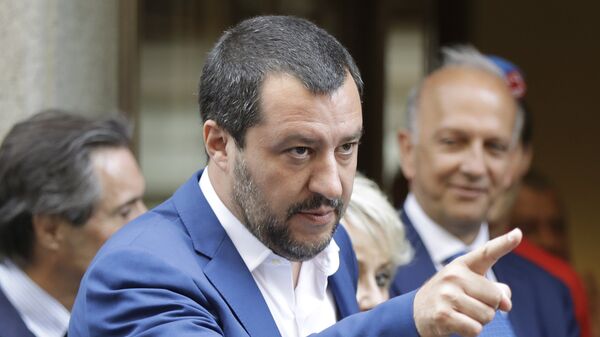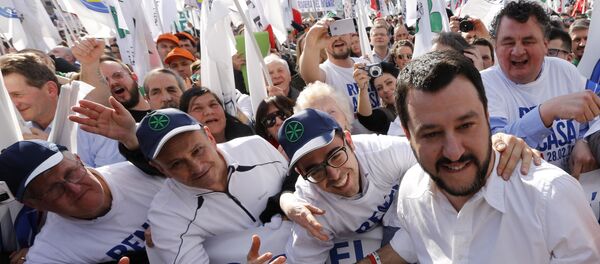Simen Ekern, a Norwegian journalist and author of "The Battle Europe's Future" has shared his views on whether Salvini-forged alliance can become a starting point for new relations between parties in the European Parliament and change the course of the EU after the upcoming vote.
Sputnik: First, I would like to clarify the terminology: for a while now nationalism and sovereignism have become synonymous in the political vocabulary. What is the difference between the two terms, what is your definition of sovereignism, and why did it arise?
Simen Ekern: In my opinion, sovereignism, although this word has French roots, as a term exists only in Italy. In France, for example, Marine Le Pen often speaks of patriotism, which is actually a euphemism for nationalism. In Italy, the term "sovereignism" plays into the hands of Salvini and his party League (Lega), since the term "nationalism" recalls the party's past.
"Sovereignism" is a much more flexible term, the connotations of which fit the current Salvini party and at the same time do not contradict the concepts of the old one, since it can be used by local patriots, supporters of Northern Italy's independence. According to them, "sovereignism" means independence from any external influences: from institutions like the European Union to migrants trying to enter Italy.
Sputnik: During the current election campaign European sovereignists have been particularly active, the culmination of which, of course, was the Salvini rally. What message did Salvini and Co. want to convey? Did the parade of European sovereignists look convincing (Internazionale dei sovranisti europei)?
Simen Ekern: The message remained the same as two years ago in Koblenz in Germany, when the European sovereignists movement was born. They want to show that they represent a powerful movement that cannot be stopped in any way; a movement approximately equivalent in all European countries, a movement consisting of large parties that will change Europe. The so-called "Salvini day" played into the image of the group, and it was an impressive sight: 11 sovereign parties in a single formation on Milan's central square.
READ MORE: Macron's Party Overtaken by Marine Le Pen's National Rally in EU Election Poll
However, the event was certainly overshadowed by the resignation of Austrian Vice Chancellor [Heinz Christian] Strache, because he is not just an ordinary politician, but an extremely important figure for the sovereignist movement, and in particular for Le Pen and Salvini.
Austria was the perfect example of the coexistence of traditional and right-wing populist-sovereign politics. But now this experiment has failed, and there are difficult times ahead for the sovereignist movement, because they also want to get elected into the European Parliament and try to work together with the traditional right-wing parties.
Sputnik: At the rally, Salvini called to transform the League from Italy's main party into the biggest force in Europe. In your opinion, is this an achievable goal?
In the elections, Salvini will surely strengthen his image as an influential politician in Italy and gain influence in Europe. But I have always believed that for him the conquest of Europe isn't important. Salvini is interested in Europe only to become stronger in Italy. After the election, the deputy PM would like to become the PM of Italy. This, in my opinion, is his most important goal, and Europe for Salvini is only a way of achieving it.
Sputnik: So far, the sovereignists seem united: Matteo Salvini, along with the leaders of 11 other parties, plans to create a single faction in the European Parliament after the 26 May elections. What happens after the election, when the time comes to divide the seats in the EP? Will the sovereignists remain in the same faction in the EP? What differences could shift the balance?
Simen Ekern: As history has shown, their "peaceful coexistence" can become difficult, because among them is the Alternative for Germany Party (AfD), which does not share Salvini's position with regards to Italy's economy, just as the Dutch [Freedom] Party of [Greet] Wilders.
It is hard to imagine that having started working in parliament; they will be able to overcome the contradictions between the countries of the south, north, and east of Europe. In reality, they can unite to block pan-European projects, for example, aimed at strengthening pan-European unity. Especially if the sovereignists succeed in attracting Viktor Orban or the Poles, they can become a force capable of blocking all the projects of a united Europe.
READ MORE: Macron Reveals Europe's 'Main Enemies' as He Warns of 'Existential Risk' to EU
Sputnik: Not without reason, one of the main proposals during the sovereignists campaign was a call to leave the eurozone and the EU. As an alternative, they proposed the creation of a "New Europe" or a "common sense Europe". What do they mean?
Simen Ekern: This is more likely a tactical move rather than an ideological one. In fact, sovereignists have not changed their views on the European Union. After Brexit, after Le Pen's election campaign against Macron, they realised that telling voters about their desire to leave the eurozone wasn't working.
Even if they say that they don't want to leave the eurozone and the EU, in reality they want to stay in the European community, but only to destroy Europe from the inside. Not to allow the implementation of any European projects, then in the long-term they will no longer be working, and nobody will need them.
The views expressed in this article are solely those of the speaker and do not necessarily reflect the official position of Sputnik.




